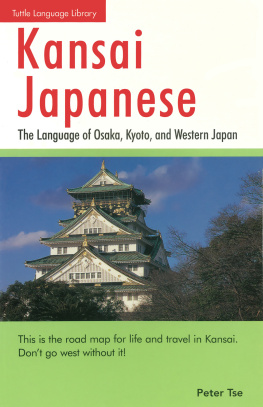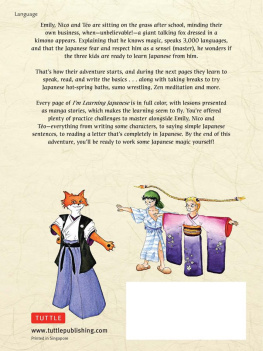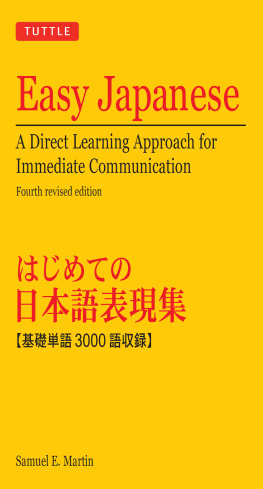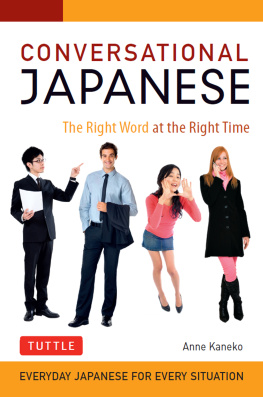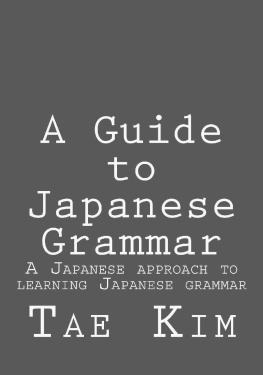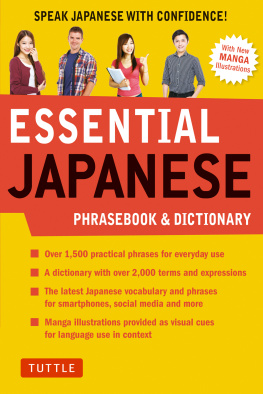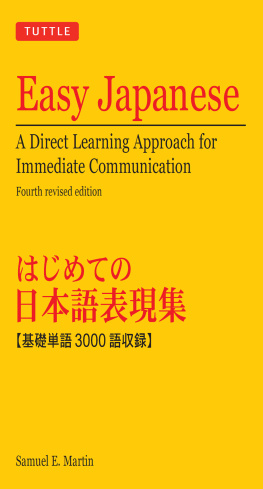Acknowledgments
Since I am a non-native speaker, I have had to rely on the assistance of many Japanese people. I am grateful to Mrs. Kazuko Shimizu for painstakingly checking the manuscript; to Mr. Koichi Mitani; to Mr. Hiroshi Ishino of the NHK Broadcasting Culture Research Institute for his information on respect language; and to Mrs. Mitsuko Kinoshita for doing the calligraphy in the final chapter on letters. I would also like to thank my non-Japanese friends. In particular, I owe much to Mr. Stephen Gomersall, formerly of the British Embassy in Tokyo, an accomplished speaker who contributed the introduction to the chapter on speeches and gave invaluable advice concerning wedding speeches; Drs. Michael and Lesley Connors, without whose support the manuscript would never have been completed; and Mrs. Sally Motomura for her sensitive illustrations.
APPENDIX:
Respect Language
Although respect language is a vestige of feudal hierarchy, its function in modern Japanese is aimed less on emphasizing differences in status and more on facilitating relationships between people. Respect language is still an important part of Japanese life. In a 1987 Nihon Hoso Kyokai (NHK) survey of two thousand people in Tokyo and Osaka, over ninety percent of the respondents felt that respect language was needed in spoken Japanese, and seventy-one percent said that it helped in their relationships with people.
Respect language is used most often in business, on formal occasions, and when meeting people for the first time. There are many ways to incorporate respect language into your speech. One way is to use polite forms of words like ikaga instead of d (how) and dochira instead of dare (who). The heart of respect language lies, however, with verbs. Humble verbs, when you are referring to yourself, lower your position vis--vis the other person; honorific verbs, when referring to others, raise their status relative to yours.
The use of respect language when talking about someone depends on whom you are talking to. For example, when a secretary wants to say that the company president is not in, she says to a colleague, Shach wa irasshaimasen (using the honorific verb irassharu). But, when speaking to a visitor, she says Shach wa orimasen (using the humble verb oru). Within the company, the president is referred to with respectful speech, but outside the company, he is referred to with humble speech. When talking to outsiders, you should use respectful speech about them, their boss, and their children, and humble speech about yourself, your boss, and your organization.
An interesting use of respect language, used almost exclusively by women, is the combination of an honorific verb and its plain ending. An example is Irassharu? (Are you going?) Such expressions do not necessarily show respect, but they do make the speech sound more genteel.
The NHK survey also asked respondents to check which factors had helped them learn respect language. Thirty-five percent said school, sixty percent said the home, fifty percent said from observing others, and nearly fifty percent said they had learned the hard way, through having their mistakes corrected by other people.
Since foreigners seldom are corrected when they make a mistake, and rarely do they have the home environment to copy, the onus is on them to observe and be sensitive to the way respect language is used. Try to recognize when respect language sounds professional and when its overuse sounds phony.
The following table provides a guide to the different levels of politeness for some common Japanese verbs. The plain form is used for informal speech, the masu form for ordinary speech, the honorific form for politely referring to others, and the humble form for politely referring to yourself.
ENGLISH | PLAIN FORM | MASU FORM | HONORIFIC FORM | HUMBLE FORM |
to be | iru | imasu | irasshaimasu | orimasu |
to exist | aru | arimasu | gozaimasu |
to go | iku | ikimasu | irasshaimasu oide ni narimasu ikaremasu ikaremasu | mairimasu ukagaimasu |
to come | kuru | kimasu | irasshaimasu oide ni narimasu o-mie ni narimasu koraremasu | mairimasu ukagaimasu agarimasu |
to do | suru | shimasu | nasaimasu saremasu | itashimasu |
to study | benky suru | benky shimasu | benky nasaimasu benky saremasu | benky itashimasu |
to say | iu | iimasu | osshaimasu | mshimasu |
to think | omou | omoimasu | o-omoi ni narimasu omowaremasu | zonjimasu |
to consider | kangaeru | kangaemasu | o-kangae ni narimasu kangaeraremasu | kangaesasete itadakimasu |
to ask | kiku | kikimasu | o-kiki ni narimasu kikaremasu | ukagaimasu o-kiki shimasu |
to see | miru | mimasu | goran ni narimasu miraremasu | haiken shimasu misete itadakimasu |
to visit | tazuneru | tazunemasu | o-tazune ni narimasu tazuneraremasu | ukagaimasu |
to know | shiru* | shirimasu* | go-zonji desu go-zonji de irasshaimasu | zonjite imasu |
to eat | taberu | tabemasu | meshi-agarimasu taberaremasu | itadakimasu |
to read | yomu | yomimasu | o-yomi ni narimasu yomaremasu | yomasete itadakimasu |
to give | ageru | agemasu | sashi-agemasu |
to give | kureru | kuremasu | kudasaimasu |
*For the verb shiru (to know), shitte iru and shitte imasu are much more often used than shiru and shirimasu.
A word on the polite forms of desu (is/am/are) is also necessary. The humble form of desu is de gozaimasu and the honorific form is de irasshaimasu; following are examples of how the two forms are used:
Watashi wa Amerika-jin de gozaimasu.
I am an American.
Tanaka Shach de irasshaimasu ka?
Are you President Tanaka?
De gozaimasu is also frequently used to make speech more polite, in much the same way that people often attach the honorific o to words like hana (flower) and shokuji (meal). Since using de gozaimasu can get very complicated, you might prefer to stick with desu. For the vast majority of everyday situations, desu is sufficiently polite.
As we have seen, using modest verbs about yourself and your organization and honorific verbs about the other person is the key to polite speech in Japanese. When talking about ones family, similar rules apply. Furthermore, Japanese also has different kinship terms depending on whether you are talking about members of your own family or of someone elses.
When speaking to your own or your spouses father or mother, use otsan and oksan; when speaking about them to people outside your family, use chichi and haha respectively. Only children use otsan and oksan when talking about their parents.


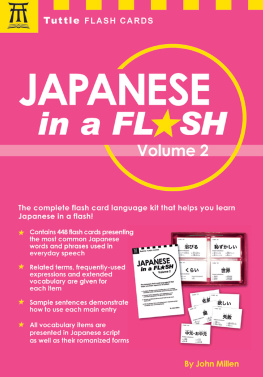
![Timothy G. Stout - Tuttle More Japanese for Kids Flash Cards Kit Ebook: [Includes 64 Flash Cards, Online Audio, Wall Chart & Learning Guide]](/uploads/posts/book/417746/thumbs/timothy-g-stout-tuttle-more-japanese-for-kids.jpg)
